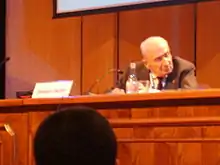Giovanni Sartori
Giovanni Sartori (Italian: [dʒoˈvanni sarˈtoːri]; 13 May 1924 – 4 April 2017) was an Italian political scientist who specialized in the study of democracy and comparative politics.
Giovanni Sartori | |
|---|---|
 | |
| Born | 13 May 1924 Florence, Italy |
| Died | 4 April 2017 (aged 92) Rome, Italy |
| Alma mater | University of Florence |
| Scientific career | |
| Fields | comparative politics |
Biography
Born in Florence in 1924, Sartori began his academic career as a lecturer in the History of Modern Philosophy. He founded the first modern Political Science academic post in Italy, and was Dean of the newly formed University of Florence's Department of Political Science. Sartori served as Albert Schweitzer Professor in the Humanities at Columbia University from 1979 to 1994 and was appointed Professor Emeritus.
He was a recipient of a Prince of Asturias Award (Social Sciences area) in 2005 and of the Karl Deutsch Award in 2009.[1] of the International Political Science Association (IPSA), which honours a prominent scholar engaged in the cross-disciplinary research.
Sartori's 1970 article "Concept Misformation in Comparative Politics" published in The American Political Science Review is prominent in the field, leading Gary Goertz to write, "There are few articles in political science that deserve the predicate "classic," but Sartori's ... merits the label."[2] Sartori's notions of "conceptual traveling" (the application of a concept from one case to a new case) and "conceptual stretching" (the mismatch that happens when a concept does not fit a new case) is influential in social science methodology.[3] Conceptual stretching is frequently used as a criticism of studies that employ large-N quantitative analysis.[4]
Sartori was also a regular contributor, as an op-ed writer, of the leading Italian newspaper Corriere della Sera. In 1971 he founded and edited the periodical Italian Political Science Review.
In 2015, he received a mexican venera of the Order of the Aztec Eagle from president Enrique Peña Nieto.[5]
Sartori died at the age of 92 in Rome from throat cancer on 4 April 2017.[6][7]
Selected publications
- Democrazia e Definizioni. Bologna: Il Mulino, 1957.
- (1970) "Concept Misformation in Comparative Politics." The American Political Science Review 64 (4): 1033–1053.
- Parties and Party Systems. Cambridge: Cambridge University Press, 1976.
- The Theory of Democracy Revisited. Chatham, N.J: Chatham House, 1987.
- Comparative Constitutional Engineering. Basingstoke: Macmillan, 1994.
- La Terra scoppia. Sovrappopolazione e sviluppo (Italy, 2003. The title means "the Earth explodes. Overpopulation and development").
See also
References
- Karl Deutsch Award Archived 2010-07-14 at the Wayback Machine
- Gary Goertz. Concept Formation. Princeton: Princeton University Press, 2006. p. 69
- Collier, David; Mahon, James E. (1993). "Conceptual "Stretching" Revisited: Adapting Categories in Comparative Analysis". The American Political Science Review. 87 (4): 845–855. doi:10.2307/2938818. ISSN 0003-0554. JSTOR 2938818. S2CID 2155412.
- Lieberman, Evan S. (August 2005). "Nested Analysis as a Mixed-Method Strategy for Comparative Research". American Political Science Review. 99 (3): 435–452. doi:10.1017/s0003055405051762. ISSN 0003-0554.
- Milenio Digital (28 November 2018); Menchú a Kushner, ¿quiénes han recibido la Orden del Águila Azteca?; Milenio (in Spanish); Retrieved 2019-10-02
- Casalini, di Simona (4 April 2017). "Muore il politologo Giovanni Sartori, inventò i termini Mattarellum e Porcellum". Repubblica.it (in Italian). Retrieved 2017-04-04.
- Verdú, Daniel (4 April 2017). "Muere el teórico de la democracia Giovanni Sartori, a los 92 años". El País (in Spanish). Retrieved 2017-04-04.
Further reading
Three books deal with the work of Sartori:
- Concepts and Method in Social Sciences. The tradition of Giovanni Sartori. David Collier and John Gerring, editors, New York: Routledge, 2009. This book is devoted to the use of concepts according to Sartori, the comparative method and his work, and includes an autobiographical essay and some more personal notes written by some of his former students, like Cindy Skach.
- La Scienza Politica di Giovanni Sartori. Gianfranco Pasquino, editor, Bologna: Il Mulino, 2005. The chapters of this book are celebration notes by Italian scholars (Domenico Fisichella, Angelo Panebianco) that have had some kind of collaboration with Sartori.
- Para Leer a Sartori. José Ramón López Rubí Calderón, editor, Mexico, 2009. This book is in Spanish, featuring articles by Gianfranco Pasquino and Dieter Nohlen, and is wider in scope. Besides, it seems, is more critical and more student-oriented. It covers the very Political Science part of Sartori's bulk of work, as well as the books that he has published dealing with such themes as multiculturalism, "videopolitics" and the environment.
External links
- Sartori's biography on ItaliaLibri
- Review of Pluralism, Multiculturalism and Foreigners: an Essay on Multiethnic Society
- Gianfranco Pasquino. (2005). "The Political Science of Giovanni Sartori". European Political Science 4 (1), 33–41.
